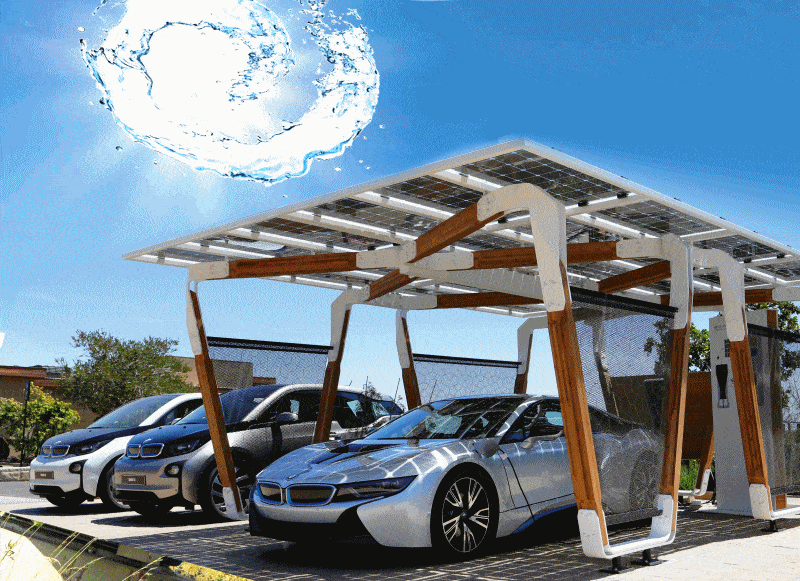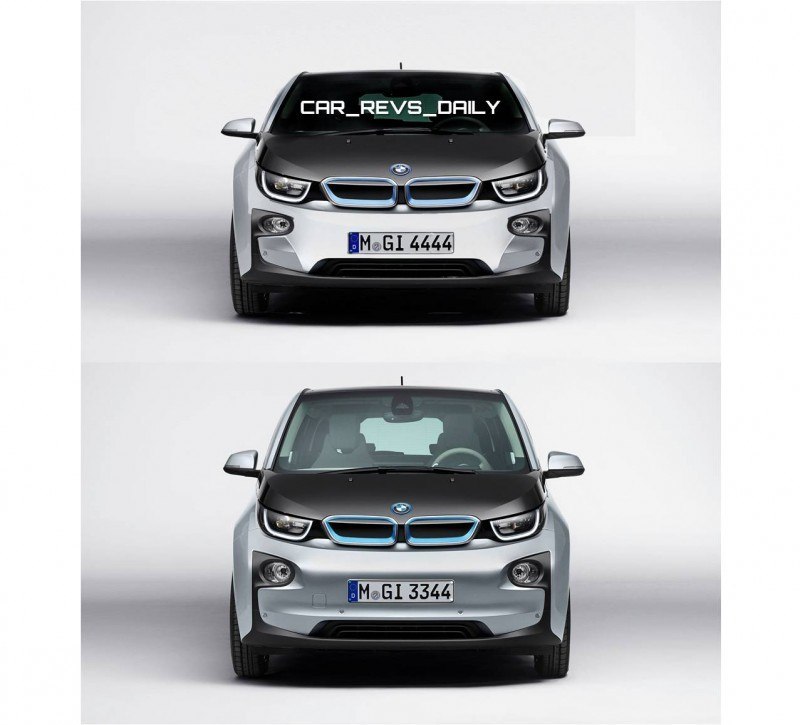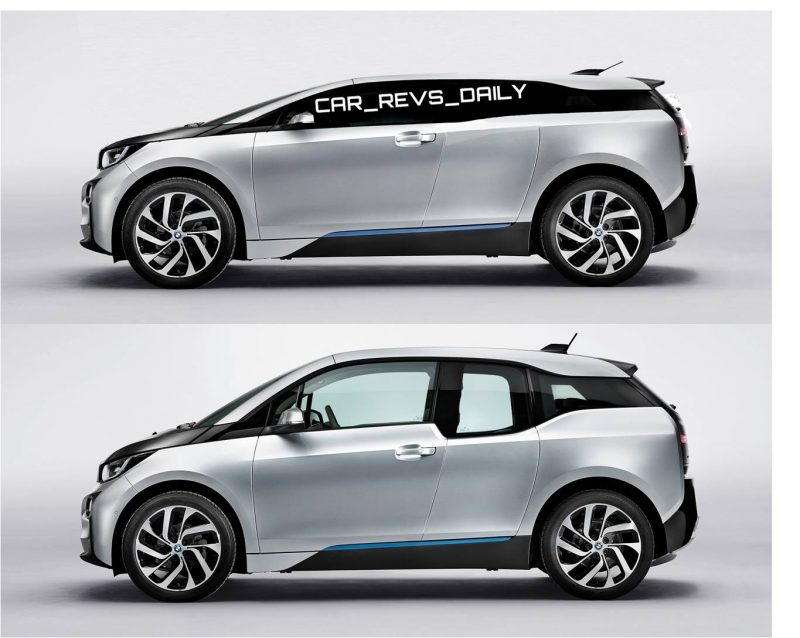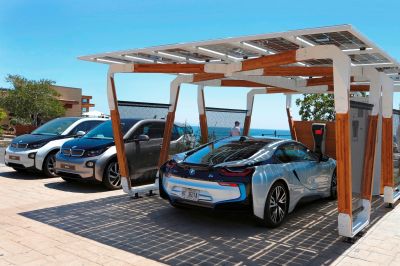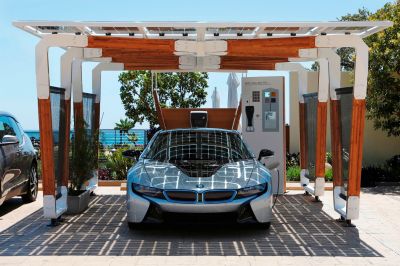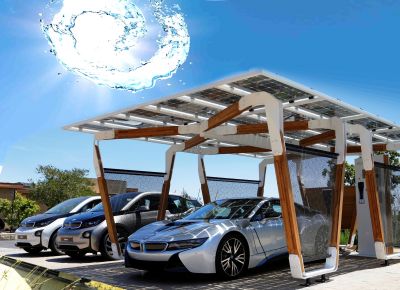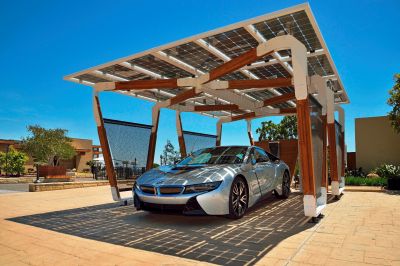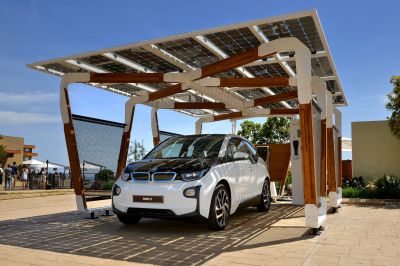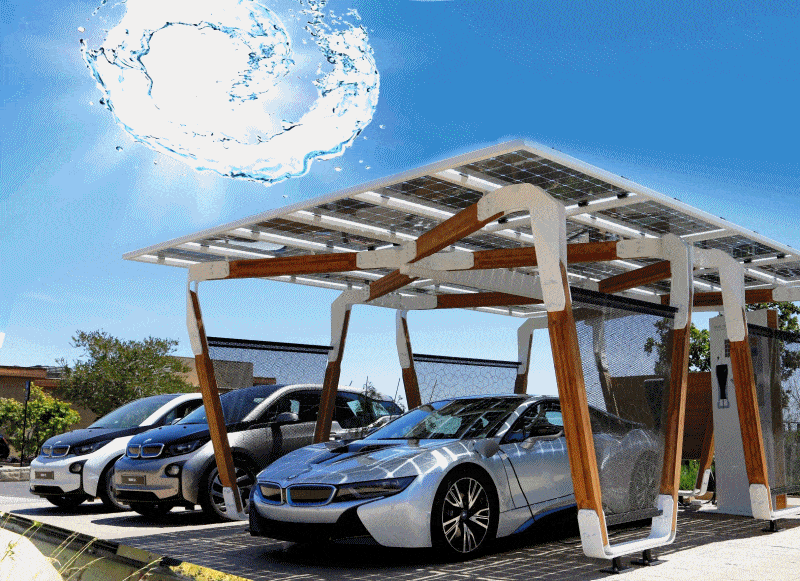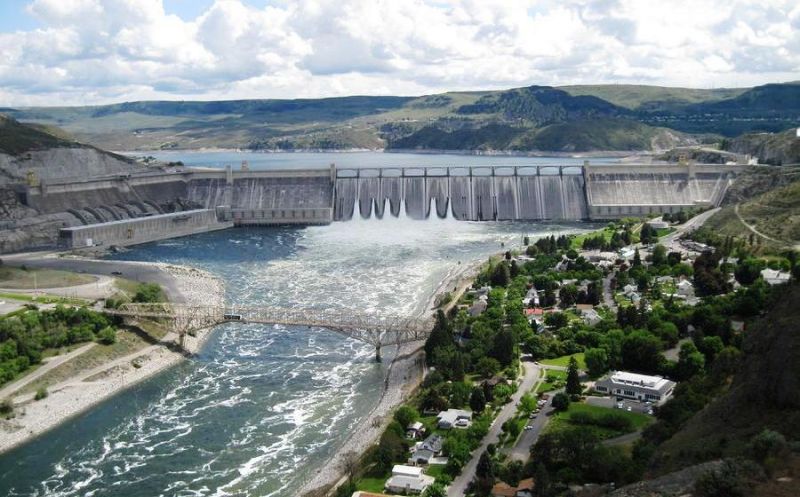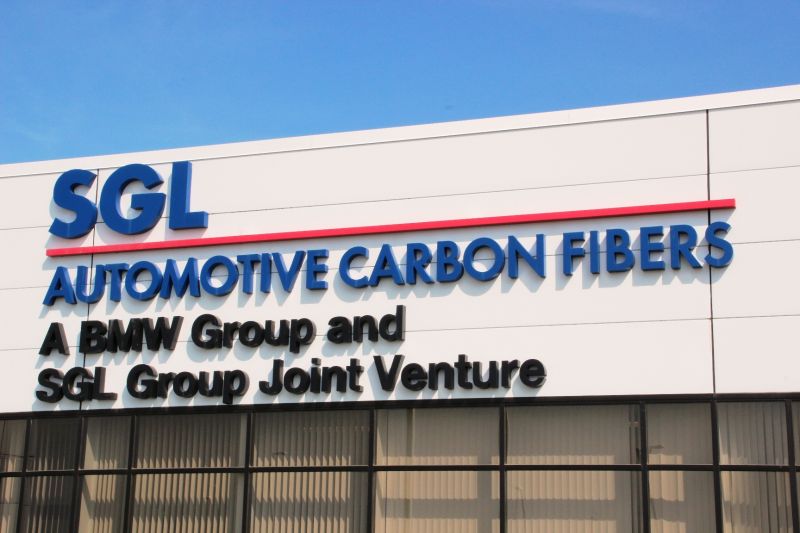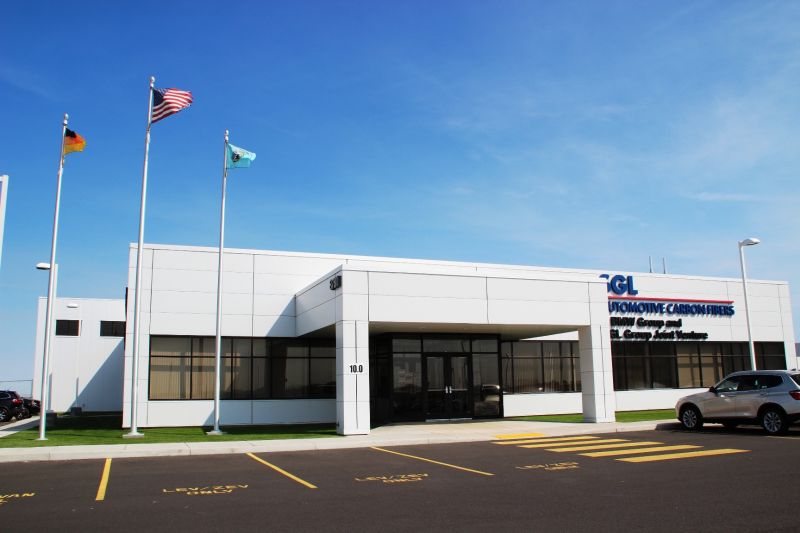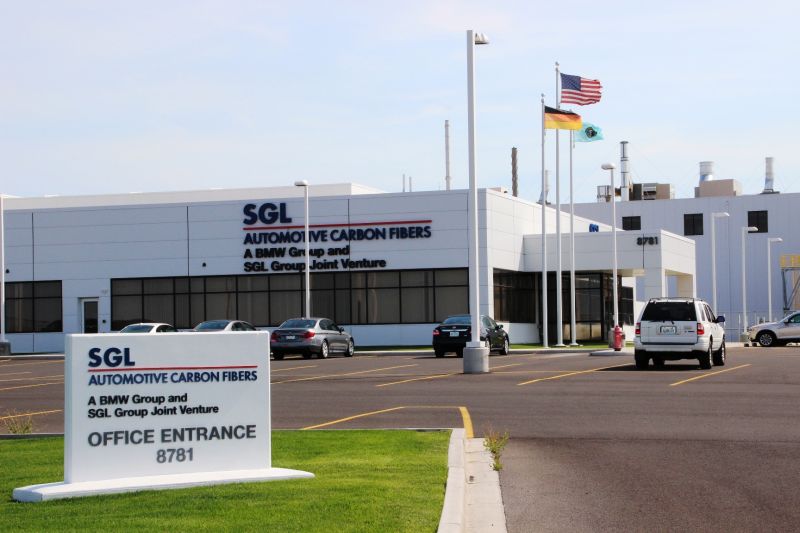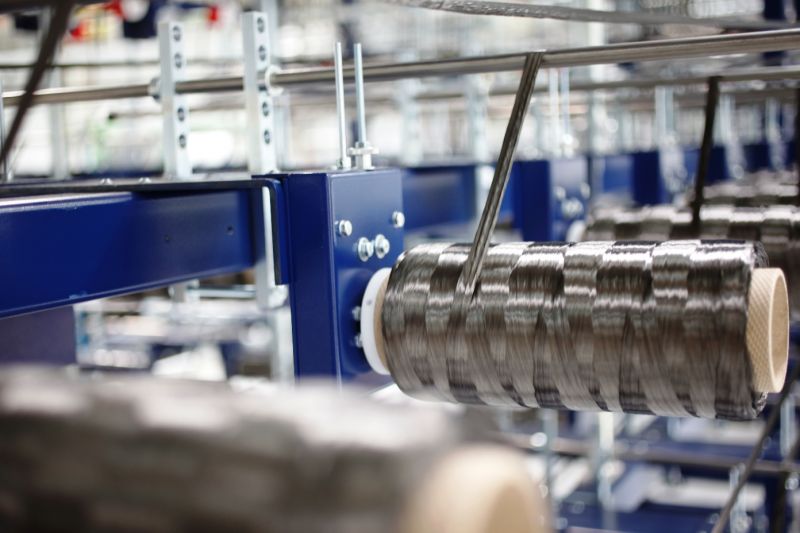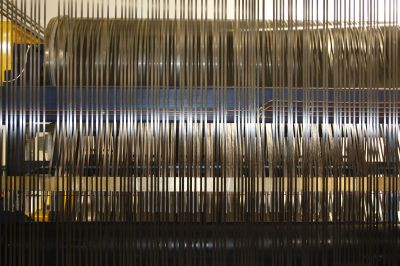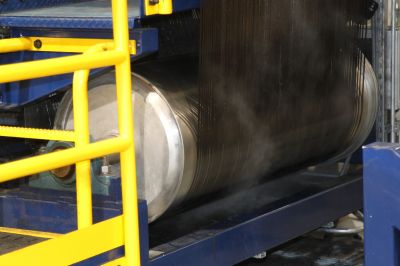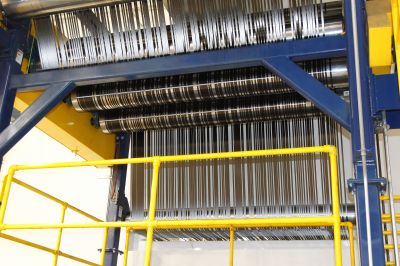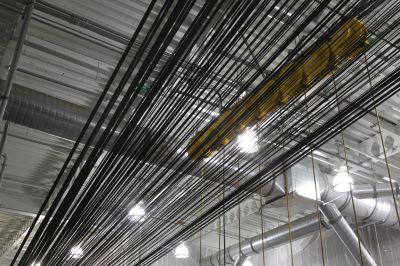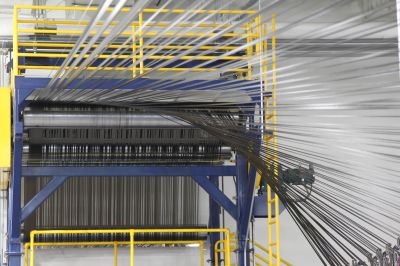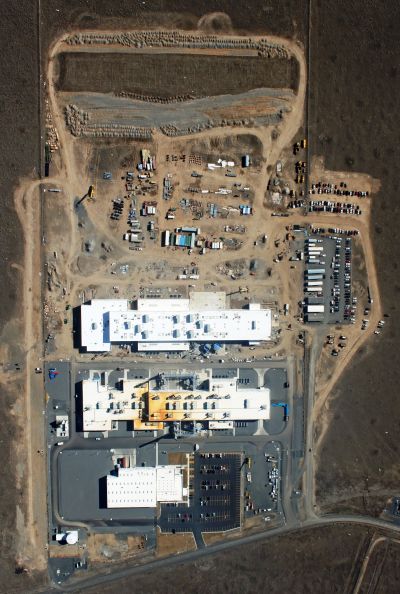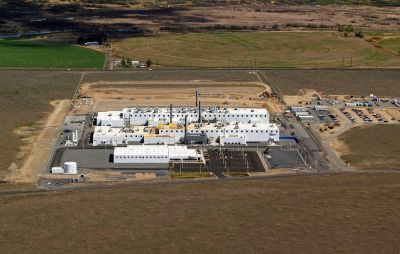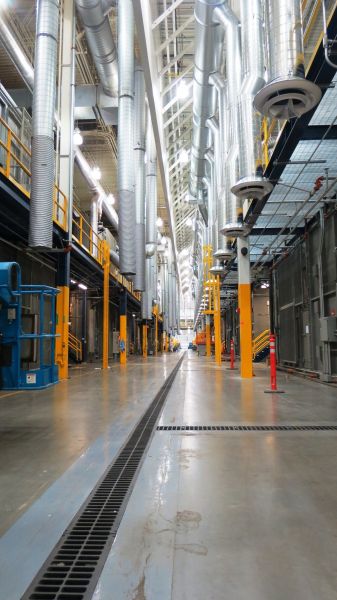The BMW i strategy is full-steam ahead — literally. Hydroelectric power in Washinton state is making it the global carbo-fiber manufacturing hub for the BMW Group, with an extra $200-million investment announced today. This will double the facility’s output and will help BMW meet strong i3 and i8 demand, as well as support the supply chain for the expected new BMW i models.
i5 and i2? i4 and i1? It really could be anything. No announcements or even concepts have indicated which number BMW might be next on the i-Makeovers list — so it really is anyone’s guess. But considering the price gap between the i3 at $42,000 and the i8 and $125,000 — an i5 with pricing from $65,000 seems most likely. Fingers crossed it looks a bit sporty — like the i4 rendering we put together just a few days ago…
But is water and hydro-electric the only renewable in BMW’s holistic approach to the i3 and i8 program? Nope. Reclaimed natural gas are part of the mix via the Spartanburg plant, which saves $5M annually by running the lights and machinery on reclaimed natural gas from the region’s landfills.
And that is not all! Downstream in consumers’ lives — solar is expected to also play a role in the renewables energy mix. BMW showed a new solar charger system in Los Angeles this week as well.
It is a mad world, but BMW’s i cars seem to be on the right path to a very green future!
Official Details below from BMW on the solar carport and carbon-fiber plant announcements.
In tune with nature – and with the BMW i design idiom: BMW Group DesignworksUSA develops a solar carport concept
Munich. With the all-electric BMW i3 already on the market and the BMW i8 plug-in hybrid sports car poised for its own launch, the BMW Group portfolio boasts the world’s first premium automobiles purpose-designed for zero-emission mobility.
The international media launch of the BMW i8 in Los Angeles will include the presentation of a solar carport concept developed by BMW Group DesignworksUSA for the use of renewable energy. It combines high-grade technology for generating electricity from solar power with an innovative design that perfectly complements the BMW i models.
In its choice of materials, design and colour, the DesignworksUSA carport concept takes its cue from the characteristic styling of the BMW i models to form a harmonious counterpart. The holistic sustainability concept is underlined by the materials used in the construction of the carport and by its solar modules. In addition to the carbon elements on the side of the carport, the principal material used is bamboo in the form of struts. Thanks to its rapid growth, bamboo is considered a particularly sustainable raw material. For the generation of electricity, high-grade glass-on-glass solar modules are used. These are translucent and very durable, as well as generating a high energy yield. For the panels used in Europe, the manufacturer offers a 30-year guarantee.
The solar carport not only guarantees the supply of green power but furthermore allows for energy self-sufficiency, so that customers remain independent of electricity prices. In conjunction with the BMW i Wallbox Pro, the car can be specifically charged with solar electricity from the carport. The Wallbox also indicates the amount of solar energy that goes into the car and provides an analysis of recent charging processes which shows the respective proportions of solar and grid power. If the solar panels provide energy beyond the requirements of the vehicle, this surplus solar power can be put to domestic use.
Generating private electricity with the aid of solar collectors and feeding this CO2-free energy via the BMW i Wallbox into the vehicle’s high-voltage battery further optimises of the life cycle assessment of the BMW i models. Regularly hooking up the high-voltage battery to the Wallbox connected to the solar carport enables a high degree of CO2-neutral usage of the BMW i8. With a fully charged high-voltage battery, the plug-in hybrid sports car has a range of around 37 kilometres (22 miles) in all-electric mode.
During development of the solar carport concept by BMW Group DesignworksUSA, the spotlight was firmly on the harmonious interplay between vehicle design and architecture. The glass-on-glass solar modules of the carport are supported by exclusively designed bamboo and carbon elements that authentically reflect the hallmark lines and surface sculpting of the BMW i automobiles. “With the solar carport concept we opted for a holistic approach: not only is the vehicle itself sustainable, but so is its energy supply,” explains Tom Allemann, who is responsible for the carport design at BMW Group DesignworksUSA. “This is therefore an entirely new generation of carports that allows energy to be produced in a simple and transparent way. It renders the overarching theme of lightweight design both visible and palpable.” The BMW Group subsidiary headquartered in California runs an international design studio network in Europe, Asia and America. As an impulse-generator in the fields of design and innovation, the company works for the BMW Group brands as well as for numerous other high-profile international clients spanning a range of industrial sectors.
BMW Group and SGL Group to triple production capacities at Moses Lake carbon fiber plant
- 09.05.2014
Additional investment of 200 million US dollars
Medium-term capacity of 9,000 tons per year
Moses Lake to become the world’s largest carbon fiber plant
Workforce in Moses Lake to be stepped up to 200
Munich / Wiesbaden / Moses Lake. Due to the high demand for carbon fiber in automotive production, SGL Automotive Carbon Fibers is going to triple the capacity of the carbon fiber plant in Moses Lake, WA (USA). This has been announced today by the joint venture partners, SGL Group and BMW Group, at the groundbreaking ceremony for the planned site expansion. The expansion will be funded by an investment of 200 million US dollars, in addition to the previously invested 100 million US dollars. The site expansion, scheduled to be completed by early 2015, will make the plant in Moses Lake the world’s largest carbon fiber plant. With the anticipated creation of 120 new jobs, the headcount at the joint venture in Moses Lake is going to rise from currently 80 to about 200 people. Due to the automated production processes, the expansion of the site in Moses Lake will make it possible for the BMW Group to apply carbon fiber material also in other model series in the future, at competitive costs and in large quantities.
At present, the Moses Lake plant operates two production lines, exclusively for BMW i, with an annual output of approx. 3,000 tons of carbon fiber. Already this summer, SGL Automotive Carbon Fibers will commission a third and fourth production line in Moses Lake, which are currently being built, thus doubling the plant’s capacity to 6,000 tons per year. Today’s groundbreaking ceremony for a fifth and sixth production line has been the first step toward tripling capacities to 9,000 tons annually in the medium term. The energy needed for the carbon fiber production is fully generated from hydropower.
“With its highly automated carbon fiber production and stringent quality standards, Moses Lake is setting new standards in the industry. At present, the site is the world’s fastest growing carbon fiber producer. Together with the BMW Group, we are doing pioneering work to establish CFRP as a material in large-series automotive production. In a mix of materials, CFRP offers new opportunities in lightweight construction for an eco-friendly mobility,” explained Dr. Jürgen Köhler, CEO of SGL Group.
Dr. Klaus Draeger, Board Member Purchasing and Supplier Network at BMW AG: “CFRP is a key material for the automotive industry of the 21st century. In our endeavor to identify increasingly lightweight materials in order to reduce a vehicle’s weight and thus its fuel consumption and carbon emissions, this material plays a crucial role. As part of an intelligent mix of materials, we will apply carbon also beyond our BMW i and BMW M models in the future. Thanks to the pooling of the SGL Group’s expertise and our knowledge in large-series production of CFRP components, we will be able to produce the ultra-lightweight high-tech material also for other model series, at competitive costs and in large quantities.”
The carbon fiber plant in Moses Lake is a key element in the strategy pursued by the two companies, which anticipates the industrialized large-series production of carbon fiber reinforced plastics (CFRP) for the application in future vehicle concepts. Up to now, carbon fiber produced in Moses Lake is exclusively used for the BMW i models. Since the start of the year, the Leipzig plant has built over 5,000 BMW i3 vehicles. At present, the production output stands at 100 units a day. Furthermore, the BMW Group has been applying the ultra-lightweight high-tech material also in its BMW M models for the past ten years.
Andreas Wüllner, CEO of SGL Automotive Carbon Fibers: “In the course of only four years, SGL Automotive Carbon Fibers has managed to become the world’s largest carbon fiber production site. The automotive industry will increasingly turn to CFRP because it is a material of the future.”
Availability of renewable energy crucial in the decision for the location in Moses Lake
As part of their joint venture agreement, the BMW Group and the SGL Group invested an initial 100 million dollars at their Moses Lake site by 2013, creating 80 new jobs. Jay Inslee, Governor of Washington State: “Congratulations to the BMW Group and the SGL Group on the groundbreaking of their fifth and sixth production line at the Moses Lake Plant. Washington State is proud to partner with BMW. The game-changing technology of carbon fiber is driving a surge in U.S. manufacturing, and with this production plant Washington State is at the forefront of that surge.”
The production of carbon fiber requires a great amount of energy. Accordingly, decisive factors for the set up of the carbon fiber plant in Moses Lake included the availability of renewable hydropower as well as competitive energy costs in Washington State. The availability of skilled workers also had an influence on the decision in favor of the location, which was taken in April 2010. The groundbreaking ceremony for the plant was in July 2010, the opening of the production site in September 2011. Dr. Jörg Pohlman, CEO of SGL Automotive Carbon Fibers: “We received great support from the regional authorities in Grant County and Moses Lake, a decisive element in making this rapid development of the past few years possible. With the site expansion, we are reaching an important milestone in safeguarding the site’s future.”
Production of carbon fiber composites
The production of carbon fiber composites for automotive manufacturing requires several process steps: The necessary precursor, which is based on polyacrylnitrile fiber, is made by a joint venture between SGL Group and the Japanese company Mitsubishi Rayon in Otake, Japan. In a next step, polyacrylnitrile fiber is turned into the actual carbon fiber in Moses Lake. This material is then processed at the second joint venture site in Wackersdorf, Germany, and turned into textile carbon fiber layers, the starting point for the production of CFRP body parts at the BMW plants in Landshut and Leipzig. In the BMW i models, CFRP already holds a significant share in the mix of materials, a first at this scope and in series production. The joint venture gives the BMW Group access to this innovative key material in the long term. The SGL Group provides their expertise in high-performance materials and their experience with carbon fiber-based materials.
SGL Group – The Carbon Company
SGL Group is one of the world’s leading manufacturers of carbon-based products and materials. It has a comprehensive portfolio ranging from carbon and graphite products to carbon fibers and composites. Products from SGL Group are used predominantly in the steel, aluminum, automotive and chemical industries as well as in the semiconductor, solar and LED sectors and in lithium-ion batteries. Carbon-based materials and products are also being used increasingly in the wind power, aerospace and defense industries.
With 44 production sites in Europe, North America and Asia as well as a service network covering more than 100 countries, SGL Group is a company with a global presence. In 2013, the Company’s workforce of around 6,300 employees generated sales of €1,477 million. The Company’s head office is located in Wiesbaden.
SGL Automotive Carbon Fibers
SGL Automotive Carbon Fibers (ACF), a joint venture between the BMW Group and SGL Group was founded in 2009 for the exclusive supply of carbon fiber materials to the BMW Group. SGL Automotive Carbon Fibers is setting new standards with their sustainable and cost-effective production and positioning the BMW Group to be the first automotive manufacturer to use carbon fiber reinforced plastic (CFRP) in series production. The carbon fiber materials, which are used in the passenger compartment of the BMW i models, will allow an entirely new vehicle designs. SGL Automotive Carbon Fibers expertise means that the vehicles will be significantly lighter while ensuring the highest safety. SGL Automotive Carbon Fibers has two production sites. In Moses Lake, WA/ USA carbon fibers spools are produced that are processed into fabrics at the second production site in Wackersdorf/ Germany. Moses Lake has a workforce of 80 employees and Wackersdorf a workforce of 150 employees.
www.sglacf.com
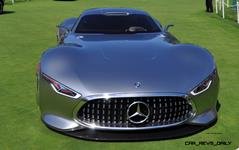
Tom Burkart is the founder and managing editor of Car-Revs-Daily.com, an innovative and rapidly-expanding automotive news magazine.
He holds a Journalism JBA degree from the University of Wisconsin – Madison. Tom currently resides in Charleston, South Carolina with his two amazing dogs, Drake and Tank.
Mr. Burkart is available for all questions and concerns by email Tom(at)car-revs-daily.com.


